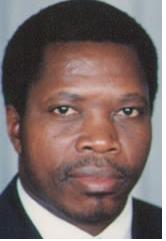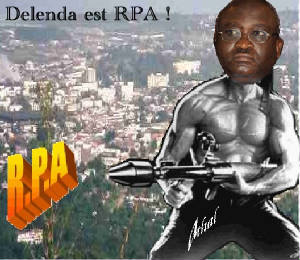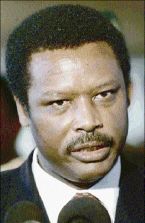|
|
 |
|
Aba bari mubahoze batwara uburundi
|
 |
|

Cyprien Ntaryamira (1955–1994), was President of Burundi from February 5, 1994 until he was assassinated on April 6.
Ntaryamira was born March 6, 1955 in the Mageyo zone, commune of Mubimbi, province of Rural Bujumbura, in what was then the Belgian-dominated United Nations Trust Territory of Burundi. He entered school in Bujumbura but after an abortive Hutu rebellion in 1972, he and thousands of other ethnic Hutus fled the country.
Ntaryamira eventually receive a degree in agriculture from the National University of Rwanda in Kigali in 1982. During this time, he became politically active in socialist movements. He returned to his native country in 1983 to work as an agricultural official. He was a political prisoner of the regime of Col. Jean-Baptiste Bagaza briefly in 1985.
In August 1986 he became a founding member and economic policy director of the Hutu-dominated Front for Democracy in Burundi party (FRODEBU). FRODEBU gained power after Burundi's first democratic elections in 1993, ending a long history of rule by the Tutsi minority and the Union for National Progress (UPRONA). New president Melchior Ndadaye appointed Ntaryamira Minister of Agriculture.
In October 1993, however, Ndadaye and his two top officials were assassinated, sparking parliamentary deadlock and civil war. Nteryamira was selected president on February 5, 1994 as a compromise; he was Hutu but considered a moderate in Ndadaye's tradition, while Anatole Kanyenkiko, a UPRONA figure,
was made prime minister.
The respite would be brief. An airplane carrying Ntaryamira and fellow Hutu president Juvénal Habyarimana of Rwanda was shot down as it landed at the Rwandan capital of Kigali, killing both. The assassination touched off the Rwandan Genocide.
On April 8 power was passed to Nteryamira's longtime associate Sylvestre Ntiybantunganya, president of the national assembly.
|
 |

Domitien Ndayizeye (b. May 2, 1953) was the president of Burundi. Of Hutu descent, he succeeded Pierre Buyoya, a Tutsi, on April 30, 2003, after serving as his vice president for 18 months.
Under his government, Ndayizeye has tried to bridge the gap between the Hutu and the minority Tutsi people of Burundi through
cooperation with other presidents in the region such as Museveni of Uganda and Mkapa of Tanzania.
The recent attack on Congolese Tutsi refugees at the border of Burundi was considered a test of the president's capacity
to maintain law and order and stability in the country. He promised swift retaliation and that the culprits would be apprehended.
In 2004, Ndayizeye proposed a draft constitution to the Parliament prior to it being put to the electorate in referendum later in
the year. Relations with the Tutsi group were strained, reflected in their boycotting of the legislative session due to consider
the proposal.
Due to a lack of preparation, the ballot was postponed, to be held in late November 2004.
Burundi is still to emerge from a civil war that began in 1993 when several groups drawn from the large Hutu majority took up arms against a government and army then
dominated by a Tutsi elite.
The interim government pledged to more equitably share power between the two main ethnic groups.
|
 |
 |
 |
|

Prince Louis Rwagasore (10 January, 1932-13 October, 1961) was a Burundi nationalist and prime minister. He was the son of Mwami (King) Mwambutsa IV. He briefly attended university in Belgium, but left to spearhead his country's anti-colonial movement. He founded a series of African cooperatives to encourage economic independence, but these were quickly banned by
Belgium in 1958.
That same year, Rwagasore established a nationalist political movement, UPRONA (Union for National Progress). Believing
that the role of the royal family should transcend partisan politics, his father promoted him to Chief of Butanyerera , but
Rwagasore turned down the appointment so that he could devote himself fully to the nationalist cause. At the first UPRONA
Congress (March 1960), he demanded complete independence for Burundi and called on the local population to boycott Belgian stores and refuse to
pay taxes. Because of his calls for civil disobedience, he was placed under house arrest.
Despite the setbacks, Rwagasore and UPRONA won a clear victory in elections for the colony's Legislative Assembly in 1961, winning 80 percent of the vote. The next day, he was declared prime minister, with a mandate to prepare the country for
independence. Just two weeks later, he was assassinated by his political rivals, the pro-Belgian PDC. He died eight months
before seeing Burundi gain its independence. Inter-ethnic rivalries between the Hutu and Tutsi factions of UPRONA flared shortly after. With Rwangasore's death came the end of his dream of a united, democratic Burundi.
|
|
 |
 |
 |
|

Major Pierre Buyoya (b. 1949) is a Burundi politician who has ruled Burundi twice, from 1987 to 1993 and from 1996 to 2003.
In September of 1987, Buyoya led a military coup against the Second Republic of Burundi, led by Jean-Baptiste Bagaza, and installed himself as the first president of the Third Republic. He proclaimed an agenda of liberalization and patching relations between Hutu and Tutsi ethnic groups, but presided over an oppressive ruling junta consisting primarily of Tutsi. This led to a Hutu uprising in
August of 1988, which caused approximately 20,000 deaths. After these killings, Buyoya appointed a commission to find a way to mediate the
violence.
This commission created a new constitution, which Buyoya approved in 1992. This constitution called for a nonethnic government with a president and a parliament. Democratic elections were held in
June 1993 and were won by the Hutu Melchior Ndadaye who created a balanced Hutu and Tutsi government. Nevertheless, the army assassinated Ndadaye and Burundi returned to civil
war. Nearly 150,000 people were killed as the war raged. There were numerous attempts at government, but even the coalition
government under Sylvestre Ntibantunganya was unable to stop the fighting.
On July 25, 1996 Buyoya returned to power in a coup, killing Ntibantunganya. The civil war became less intense but continued. Economic sanctions were also imposed by the international community because of the nature of Buyoya's return to power, but were eased as Buyoya
created an ethnically inclusive government. Buyoya selected as his vice-president Domitien Ndayizeye, a Hutu. The conditions of the governmental agreement required Buyoya to hand over power in 2003, which he did. Ndayizeye
became the president of Burundi on April 30.
|
|
|
|
Imiyabaga, twese hamwe, dukwiriye kuva hasi tukarondera amahoro y'igihugu cacu, nakare nitwebwe Burundi bwejo.
Copyright © 2005- Samuel Girukwishaka
|
|
|
 |

